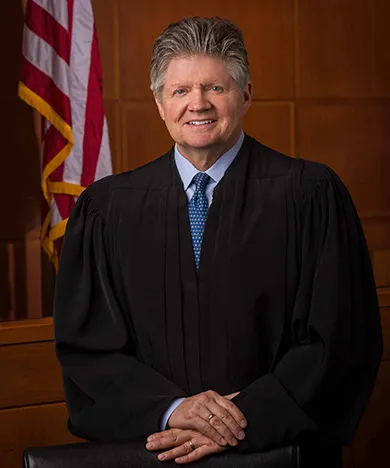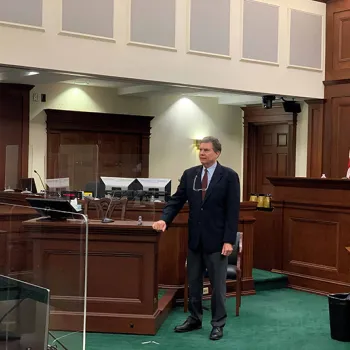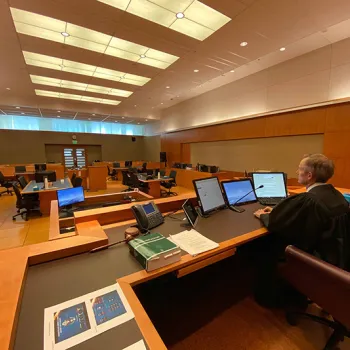As coronavirus (COVID-19) case totals continue to decline in the United States, federal courts are rapidly expanding the number of jury trials and other in-person proceedings. But many court leaders remain uncertain about how quickly they can achieve a full return to pre-pandemic operations.
While some courts say social distancing requirements and other COVID-related issues are likely to limit the number of jury trials, at least for the next few months, an increase in vaccinations and the recent relaxation of federal guidelines are raising the possibility of a more rapid reopening schedule.
The Northern District of New York recently began its first criminal jury trial since March 2020, when the pandemic prompted many federal courts to scale back in-person hearings and trials. But the court is still assessing whether mask requirements and social distancing can be eliminated for jurors and the public after a year of pandemic restrictions.
“The court is committed to taking a measured approach to relaxing the current restrictions,” said Clerk of Court John M. Domurad. “We want to be careful. We’ve gained so much, we don’t want to lose what we’ve gained by shedding restrictions too quickly.”
For more than a year, federal courts have operated under a dynamic “gating” strategy, easing and tightening restrictions on courthouse procedures based on improvements or deterioration in local health conditions. Some courts resumed limited jury trials last summer, only to pull back during a winter resurgence of COVID.
In recent months, as infection and hospitalization rates have fallen sharply, dozens of courts have reported changing their status from Phase 1 or 2, in which limited in-person proceedings are conducted, to Phase 3 or 4, in which jury trials can be conducted. Officials caution that future changes could tighten restrictions again.
Even in districts where COVID numbers are falling most rapidly, some judges are reporting they still must overcome challenges to stage trials.
“COVID numbers in our district are plummeting, and that’s wonderful,” said Chief Judge James K. Bredar of the District of Maryland. “But our detention facilities continue to lock down entire housing units when even a single inmate tests positive. That means the detainees on that housing unit cannot be transported to courts, or even to the areas within the detention facility used for video hearings. So, even with improving virus metrics and climbing vaccination statistics, we are still disrupted by COVID.“
Two of the biggest quandaries facing courts are whether vaccinations can or should be required of jurors and court staff, and whether strict social distancing is still necessary as more adults become vaccinated. In interviews, most court leaders say they are not requiring vaccinations, but that they are taking a wait and see approach on relaxing other COVID precautions. All say that assuring jurors they are safe is a top priority.
“We believe that with the appropriate safety measures in place, the American public can feel safe to participate in jury trials as jurors, observers, or witnesses,” said Chief Judge Algenon L. Marbley, of the Southern District of Ohio, which resumed a full jury trial schedule on May 3. “The Court has not been asking about juror vaccination, but we may do so in the future.”
Courts are still unclear how recent guidance from the Centers for Disease Control and Prevention may alter their decision-making. Noting that those with vaccinations no longer need to wear masks, Chief Judge Philip A. Brimmer of the District of Colorado said that courts still face difficult choices.

Chief Judge Philip A. Brimmer, District of Colorado: “Social distancing imposes many limitations on a court’s ability to return to normal.”
“To what extent should courts accommodate fully vaccinated jurors who want to be socially distanced?” Brimmer asked. “Social distancing imposes many limitations on a court’s ability to return to normal. But it seems harsh to tell people who just a few weeks ago were being praised for their precautions that they now need to get over their qualms about having someone sit right next to them.”
Courtroom capacity also is affecting how quickly different districts can schedule jury trials.
The Southern District of Ohio has enough courtrooms to conduct eight jury trials simultaneously—three each in its Cincinnati and Columbus courthouses and two more in Dayton. In addition to outfitting each juror’s chair with plexiglass, the court gives each juror a sealed plastic bag that contains a mask, gloves, hand sanitizer, writing pad and pen. The court has sufficient space to put the public in overflow courtrooms if needed, and to allow jurors to maintain social distancing.
In the District of Minnesota, Chief Judge John R. Tunheim said, courthouses in Minneapolis and St. Paul each have only one courtroom fully retrofitted with plexiglass to protect jurors. As a result, only one jury trial at a time is being held in each city. A total of three courtrooms are needed for each trial, to accommodate social-distancing needs.

Chief Judge John R. Tunheim, District of Minnesota: “We have done everything possible to make our facilities safe.”
Beginning Aug. 1, all courtrooms in Minnesota will be authorized for civil trials, which can fit the required eight-member juries in a standard jury box, but at present, expanding the number of criminal jury trials would require additional installation of plexiglass barriers.
“We still want to keep the number of people in the courthouses to a minimum to prevent spread,” Tunheim said. “We are using at least two other courtrooms for each trial - one for jury deliberations and the other for the public/media to watch the trial without being in the courtroom. I am anticipating utilizing the single courtroom plan for criminal trials through the end of the summer and then reassess.”
Even a limited capacity to hold jury trials can have an additional benefit in completing court business. In the District of Colorado, listing cases as pilot trials or backup pilot trials has greatly facilitated settlement of cases.
Read the Series
This is the sixth in a series of articles about how federal courts are working to recover from the COVID-19 crisis.
“Until a case gets on the calendar, it’s not going anywhere,” Brimmer said. “So being able to hold even some jury trials is helping us reduce our backlog.”
Court officials emphasize that they are making every effort to protect jury and public safety. Courts, they say, are ready to deliver justice even as the COVID crisis winds down.
“We have done everything possible to make our facilities safe and will continue to be vigilant about health and safety,” Tunheim said. “I would also say that our criminal justice system is vitally important. Defendants have a right to a fair and speedy trial, so despite the challenges, it is important that we move forward with trials and hearings.”
Subscribe to News Updates
Subscribe to be notified when the news section is updated.


